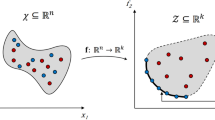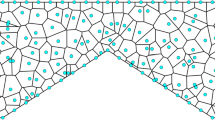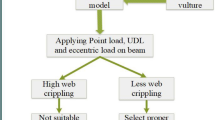Abstract
The single-loop method (SLM) for reliability-based design optimization (RBDO) can be inaccurate when constraint functions are highly nonlinear because it uses gradient information calculated at the approximated most probable point (MPP) of the previous iteration. To overcome this limitation, this paper presents a new adaptive SLM (ASLM) that can automatically select the gradient at the approximate MPP of the previous iteration or the design point of the current iteration. If the design movement is large, the normalized gradient is calculated at the current design point, and the approximate MPP is calculated using the mean value method, and if small, the gradient is calculated at the approximate MPP of the previous iteration. In this study, a post optimization (PO) technique using constraint boundary sampling (CBS) is also proposed to improve the accuracy of ASLM. In the proposed method, ASLM is performed first, and then PO is applied to find a more accurate RBDO optimum using the Kriging model generated by samples accumulated during ASLM and sequentially added by CBS when the Kriging model is not accurate enough. Numerical studies show that the proposed ASLM is more efficient than the existing RBDO methods and the proposed PO improves its accuracy.
Similar content being viewed by others
Change history
13 August 2018
There are two corrections to make to the original article.
References
A. M. Hasofer and N. C. Lind, Exact and invariant secondmoment code format, Journal of the Engineering Mechanics Division, 100 (1) (1974) 111–121.
J. Tu, K. K. Choi and Y. H. Park, A new study on reliabilitybased design optimization, Journal of Mechanical Design, 121 (4) (1999) 557–564.
L. Gallimard, Error bounds for the reliability index in finite element reliability analysis, International Journal for Numerical Methods in Engineering, 87 (8) (2011) 781–794.
L. Gallimard, P. Vidal and O. Polit, Coupling finite element and reliability analysis through proper generalized decomposition model reduction, International Journal for Numerical Methods in Engineering, 95 (13) (2013) 1079–1093.
K. Breitung, Asymptotic approximations for multinormal integrals, Journal of Engineering Mechanics, 110 (3) (1984) 357–366.
M. Hohenbichler and R. Rackwitz, Improvement of secondorder reliability estimates by importance sampling, Journal of Engineering Mechanics, 114 (12) (1988) 2195–2199.
L. Tvedt, Distribution of quadratic forms in normal spaceapplication to structural reliability, Journal of Engineering Mechanics, 116 (6) (1990) 1183–1197.
J. W. Park and I. Lee, A study on computational efficiency improvement of novel SORM using the convolution integration, Journal of Mechanical Design, 140 (2) (2018) 024501.
H. Xu and S. Rahman, A generalized dimension-reduction method for multidimensional integration in stochastic mechanics, International Journal for Numerical Methods in Engineering, 61 (12) (2004) 1992–2019.
I. Lee, K. K. Choi, L. Du and D. Gorsich, Inverse analysis method using MPP-based dimension reduction for reliability-based design optimization of nonlinear and multidimensional systems, Computer Methods in Applied Mechanics and Engineering, 198 (1) (2008) 14–27.
Y. Noh, K. K. Choi and I. Lee, Reduction of ordering effect in reliability-based design optimization using dimension reduction method, AIAA Journal, 47 (4) (2009) 994–1004.
S. B. Kang, J. W. Park and I. Lee, Accuracy improvement of the most probable point-based dimension reduction method using the hessian matrix, International Journal for Numerical Methods in Engineering, 111 (3) (2017) 203–217.
R. Jin, X. Du and W. Chen, The use of metamodeling techniques for optimization under uncertainty, Structural and Multidisciplinary Optimization, 25 (2) (2003) 99–116.
B. D. Youn and K. K. Choi, A new response surface methodology for reliability-based design optimization, Computers & Structures, 82 (2–3) (2004) 241–256.
J. H. Choi, W. H. Lee, J. J. Park and B. D. Youn, A study on robust design optimization of layered plate bonding process considering uncertainties, Structural and Multidisciplinary Optimization, 35 (6) (2008) 531–540.
W. Zhao and Z. Qiu, An efficient response surface method and its application to structural reliability and reliabilitybased optimization, Finite Elements in Analysis and Design, 67 (2013) 34–42.
C. Hu and B. D. Youn, Adaptive-sparse polynomial chaos expansion for reliability analysis and design of complex engineering systems, Structural and Multidisciplinary Optimization, 43 (3) (2011) 419–442.
E. Nikolaidis and R. Burdisso, Reliability based optimization: a safety index approach, Computers & Structures, 28 (6) (1988) 781–788.
I. Enevoldsen and J. D. Sørensen, Reliability-based optimization in structural engineering, Structural Safety, 15 (3) (1994) 169–196.
M. V. Reddy, R. V. Grandhi and D. A. Hopkins, Reliability based structural optimization: a simplified safety index approach, Computers & Structures, 53 (6) (1994) 1407–1418.
B. D. Youn and K. K. Choi, An investigation of nonlinearity of reliability-based design optimization approaches, Journal of Mechanical Design, 126 (3) (2004) 403–411.
P. Yi and G. Cheng, Further study on efficiency of sequential approximate programming for probabilistic structural design optimization, Structural and Multidisciplinary Optimization, 35 (6) (2008) 509–522.
Y. T. Wu, H. R. Millwater and T. A. Cruse, Advanced probabilistic structural analysis method for implicit performance functions, AIAA Journal, 28 (9) (1990) 1663–1669.
Y. T. Wu, Computational methods for efficient structural reliability and reliability sensitivity analysis, AIAA Journal, 32 (8) (1994) 1717–1723.
B. D. Youn, K. K. Choi and L. Du, Adaptive probability analysis using an enhanced hybrid mean value method, Structural and Multidisciplinary Optimization, 29 (2) (2005) 134–148.
B. Keshtegar and P. Hao, A hybrid self-adjusted mean value method for reliability-based design optimization using sufficient descent condition, Applied Mathematical Modelling, 41 (2017) 257–270.
B. D. Youn, K. K. Choi and Y. H. Park, Hybrid analysis method for reliability-based design optimization, Journal of Mechanical Design, 125 (2) (2003) 221–232.
B. Keshtegar and I. Lee, Relaxed performance measure approach for reliability-based design optimization, Structural and Multidisciplinary Optimization, 54 (6) (2016) 1439–1454.
B. Keshtegar, A modified mean value of performance measure approach for reliability-based design optimization, Arabian Journal for Science and Engineering, 42 (3) (2017) 1093–1101.
B. Keshtegar and P. Hao, Enriched self-adjusted performance measure approach for reliability-based design optimization of complex engineering problems, Applied Mathematical Modelling, 57 (2018), 37–51.
M. A. Valdebenito and G. I. Schuëller, A survey on approaches for reliability-based optimization, Structural and Multidisciplinary Optimization, 42 (5) (2010) 645–663.
Z. Chen, S. Peng, X. Li, H. Qiu, H. Xiong, L. Gao and P. Li, An important boundary sampling method for reliabilitybased design optimization using kriging model, Structural and Multidisciplinary Optimization, 52 (1) (2015) 55–70.
X. Chen, T. Hasselman and D. Neill, Reliability based structural design optimization for practical applications, Proc. of the 38th Structures, Structural Dynamics, and Materials Conference, Kissimmee, Florida, USA (1997) 1403.
B. Bichon, S. Mahadevan and M. Eldred, Reliability-based design optimization using efficient global reliability analysis, Proc. of the 50th AIAA/ASME/ASCE/AHS/ASC Structures, Structural Dynamics, and Material Conference, Palm Springs, California, USA (2009) 2261.
Y. Aoues and A. Chateauneuf, Benchmark study of numerical methods for reliability-based design optimization, Structural and Multidisciplinary Optimization, 41 (2) (2010) 277–294.
Y. T. Wu and W. Wang, Efficient probabilistic design by converting reliability constraints to approximately equivalent deterministic constraints, Journal of Integrated Design and Process Science, 2 (4) (1998) 13–21.
Y. T. Wu, Y. Shin, R. Sues and M. Cesare, Safety-factor based approach for probability-based design optimization, 19th AIAA Applied Aerodynamics Conference, Seattle, Washington, USA (2001) 1522.
X. Du and W. Chen, Sequential optimization and reliability assessment method for efficient probabilistic design, Journal of Mechanical Design, 126 (2) (2004) 225–233.
X. Du, J. Guo and H. Beeram, Sequential optimization and reliability assessment for multidisciplinary systems design, Structural and Multidisciplinary Optimization, 35 (2) (2008) 117–130.
J. Lim, B. Lee and I. Lee, Sequential optimization and reliability assessment based on dimension reduction method for accurate and efficient reliability-based design optimization, Journal of Mechanical Science and Technology, 29 (4) (2015) 1349–1354.
P. Yi, Z. Zhu and J. Gong, An approximate sequential optimization and reliability assessment method for reliabilitybased design optimization, Structural and Multidisciplinary Optimization, 54 (6) (2016) 1367–1378.
L. Wang and S. Kodiyalam, An efficient method for probabilistic and robust design with non-normal distributions, 43rd AIAA/ASME/ASCE/AHS/ASC Structures, Structural Dynamics, and Materials Conference, Denver, Colorado, USA (2002) 1754.
J. Liang, Z. P. Mourelatos and J. Tu, A single-loop method for reliability-based design optimization, International Journal of Product Development, 5 (1/2) (2008) 76–92.
S. Shan and G. G. Wang, Reliable design space and complete single-loop reliability-based design optimization, Reliability Engineering & System Safety, 93 (8) (2008) 1218–1230.
F. Li, T. Wu, A. Badiru, M. Hu and S. Soni, A single-loop deterministic method for reliability-based design optimization, Engineering Optimization, 45 (4) (2013) 435–458.
B. D. Youn, Adaptive-loop method for non-deterministic design optimization, Proceedings of the Institution of Mechanical Engineers, Part O: Journal of Risk and Reliability, 221 (2) (2007) 107–116.
G. Li, Z. Meng and H. Hu, An adaptive hybrid approach for reliability-based design optimization, Structural and Multidisciplinary Optimization, 51 (5) (2015) 1051–1065.
J. Lim and B. Lee, A semi-single-loop method using approximation of most probable point for reliability-based design optimization, Structural and Multidisciplinary Optimization, 53 (4) (2016) 745–757.
C. Jiang, H. Qiu, L. Gao, X. Cai and P. Li, An adaptive hybrid single-loop method for reliability-based design optimization using iterative control strategy, Structural and Multidisciplinary Optimization, 56 (6) (2017) 1271–1286.
S. B. Jeong and G. J. Park, Single loop single vector approach using the conjugate gradient in reliability based design optimization, Structural and Multidisciplinary Optimization, 55 (4) (2017) 1329–1344.
Z. Meng, D. Yang, H. Zhou and B. P. Wang, Convergence control of single loop approach for reliability-based design optimization, Structural and Multidisciplinary Optimization, 57 (3) (2018) 1079–1091.
B. Keshtegar and P. Hao, Enhanced single-loop method for efficient reliability-based design optimization with complex constraints, Structural and Multidisciplinary Optimization (2017) 1–17.
J. Lim, B. Lee and I. Lee, Post optimization for accurate and efficient reliability-based design optimization using second- order reliability method based on importance sampling and its stochastic sensitivity analysis, International Journal for Numerical Methods in Engineering, 107 (2) (2016) 93–108.
T. H. Lee and J. J. Jung, A sampling technique enhancing accuracy and efficiency of metamodel-based RBDO: Con straint boundary sampling, Computers & Structures, 86 (13) (2008) 1463–1476.
M. Rosenblatt, Remarks on a multivariate transformation, The Annals of Mathematical Statistics, 23 (3) (1952) 470–472.
A. Haldar and S. Mahadevan, Probability, reliability and statistical methods in engineering design, John Wiley, New York, USA (2000).
P. W. Glynn and D. L. Iglehart, Importance sampling for stochastic simulations, Management Science, 35 (11) (1989) 1367–1392.
G. Matheron, Principles of geostatistics, Economic Geology, 58 (8) (1963) 1246–1266.
B. D. Youn, K. K. Choi and L. Du, Enriched performance measure approach for reliability-based design optimization, AIAA Journal, 43 (4) (2005) 874–884.
H. Liu, S. Xu, Y. Ma, X. Chen and X. Wang, An adaptive Bayesian sequential sampling approach for global metamodeling, Journal of Mechanical Design, 138 (1) (2016) 011404.
S. Rahman, Stochastic sensitivity analysis by dimensional decomposition and score functions, Probabilistic Engineering Mechanics, 24 (3) (2009) 278–287.
R. Y. Rubinstein, Simulation and Monte Carlo method, John Wiley & Sons: New York, USA (1981).
C. Y. Lin, W. H. Huang, M. C. Jeng and J. L. Doong, Study of an assembly tolerance allocation model based on Monte Carlo simulation, Journal of Materials Processing Technology, 70 (1–3) (1997) 9–16.
Y. Noh, K. K. Choi and L. Du, Reliability-based design optimization of problems with correlated input variables using a Gaussian Copula, Structural and Multidisciplinary Optimization, 38 (1) (2009) 1–16.
R. J. Yang and L. Gu, Experience with approximate reliability-based optimization methods, Structural and Multidisciplinary Optimization, 26 (1–2) (2004) 152–159.
J. Haynes and R. Kenny, Modifications to the NASA SP-8072 distributed source method II for Ares I lift-off environment predictions, 15th AIAA/CEAS Aeroacoustics Conference, Miami, Florida, USA (2009) 3160.
Author information
Authors and Affiliations
Corresponding author
Additional information
Recommended by Associate Editor Gang-Won Jang
Sang-Hyeon Choi is a Senior Researcher of KSLV-II R&D Head Office at Korea Aerospace Research Institute (KARI), and a Ph.D. candidate of Mechanical Engineering at KAIST, Korea. He joined KARI in 2006. His current research interests include reliabilitybased design optimization and surrogate modeling.
Ikjin Lee is an Associate Professor of Mechanical Engineering at KAIST, Korea. He received his Ph.D. in Mechanical Engineering at the University of Iowa. He joined KAIST in 2013. His current research interests include system reliability analysis and design optimization, surrogate modeling, and system robustness analysis and design.
Rights and permissions
About this article
Cite this article
Choi, SH., Lee, G. & Lee, I. Adaptive single-loop reliability-based design optimization and post optimization using constraint boundary sampling. J Mech Sci Technol 32, 3249–3262 (2018). https://doi.org/10.1007/s12206-018-0627-5
Received:
Revised:
Accepted:
Published:
Issue Date:
DOI: https://doi.org/10.1007/s12206-018-0627-5




